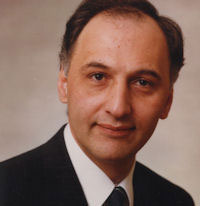An international trial led by medics at the University of Liverpool has shown a commonly used chemotherapy drug is as effective at helping prevent pancreatic cancer returning after surgery as the more expensive standard chemotherapy treatment.
The results of the Cancer Research UK- funded study raise hopes that a new trial looking at giving both drugs after surgery could lead to a more effective treatment for pancreatic cancer patients who are eligible for surgery.
It also means the second cheaper drug could be prescribed in cases when the standard chemotherapy has failed, providing an extra lifeline for patients whose cancer comes back after surgery.
Pancreatic cancer is the tenth most common cancer in the UK and nearly 7,800 people are diagnosed with the disease each year. But survival rates remain a major concern – only around three per cent of patients survive for more than five years, although the five-year survival improves to around ten per cent for patients suitable for surgery.
Professor John Neoptolemos, from the Institute of Translational Medicine, said: “Until now the best way to treat pancreatic cancer has been unclear. But these results are the first to directly compare these two chemotherapies and show undoubtedly that they are both as effective as each other.
“Importantly this means patients now have a backup in case their cancer fails to respond to the first line of treatment. We‘ve already launched a new trial investigating whether combining the two treatments could be even more effective and prolong life.
“We’re still a long way from being able to reduce the number of people who die from this disease, but this research is a vital step in the right direction.”
The trial, called European Study Group for Pancreatic Cancer (ESPAC)-3, is the largest of its kind and involved 159 centres in Europe, Australasia, Japan and Canada which between them recruited 1088 patients who had undergone surgery for pancreatic cancer.
One group had the standard treatment of a chemotherapy drug called gemcitabine. The second group had a cheaper widely available drug called 5-fluorouralcil (5-FU) that is commonly used in cancer treatment already.
The results mean that 5-FU should now also be considered one of the standard options for the treatment of patients with this disease.
They build on earlier trial results suggesting patients who had surgery and chemotherapy had better a chance of survival than patients who only had surgery.
The study is published in the Journal of the American Medical Association.
Notes to editors:
1. The University of Liverpool is a member of the Russell Group of leading research-intensive institutions in the UK. It attracts collaborative and contract research commissions from a wide range of national and international organisations valued at more than £98 million annually.
2. The ESPAC-4 trial:
The ESPAC-4 trial launched in 2008 after early results from the ESPAC-3 trial and others suggested that adding an additional chemotherapy drug to the standard chemotherapy could help prevent pancreatic cancer returning after surgery.
Cancer of the pancreas is very difficult to treat. If possible, doctors use surgery to remove the cancer. But even if the cancer is removed, there is a risk that it will come back. Some trials have shown that having chemotherapy after surgery helps to stop or delay the cancer coming back.
Gemcitabine is a chemotherapy drug that doctors often use to treat cancer of the pancreas. In this trial, the researchers are investigating whether adding another drug called capecitabine is any more effective than giving gemcitabine alone after surgery for pancreatic cancer.
Anyone affected by cancer or interested in finding out more about the ESPAC-4 trial can contact Cancer Research UK’s cancer information nurses on 0808 800 4040 (freephone) or visit the charity’s patient information website www.cancerhelp.org.uk.
